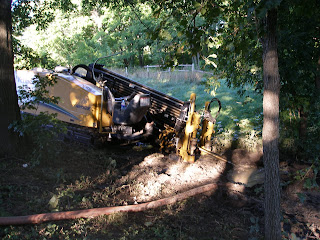Çompost tainted by Dow chemicals kill thousands of home gardens!
Watch Out For Killer Compost
By Cheryl Long and Barbara Pleasant, Mother Earth News
Gardeners beware — straw, manure and maybe even compost can kill your garden, thanks to the folks at the Dow chemical company. An herbicide called aminopyralid, released by DowAgroscience in 2005 and aggressively marketed to horse and cattle owners to control perennial weeds, has been associated with the loss of thousands of home gardens in Great Britain this year. So can it happen here? You bet! Previously treated straw and even well-rotted manure may carry enough persistent plant killer to kill tomatoes, lettuce, beans and other sensitive crops.
Dow's Clouded History
This is the second time that Dow herbicides that were supposed to degrade within days were found to persist for years. In 2001, Dow's clopyralid (still sold as Confront), was found to be the contaminant in compost that killed home garden and nursery plants in Washington, Pennsylvania and New Zealand. Aminopyralid, the active ingredient in common herbicides Milestone and Forefront, belongs to the same class of chemicals that includes clopyralid.
Dow's behavior defies environmental corporate responsibility. They know their product is capable of causing significant environmental harm, yet they continue not only to sell it, but develop and sell new products that pose equal or greater risks. And shame on the U.S. Environmental Protection Agency (EPA) for letting this happen again!
How Did This Happen?
A close read of the EPA's paper trail shows that the half-life (the time it is expected to persist) of aminopyralid in soil was never clearly determined. Still, the EPA decided that aminopyralid was "safe for humans and the environment." The license to sell was granted despite the fact that Dow's own data showed a half-life of up to 533 days. Despite that, only two studies were done to investigate its persistence in soil. Even though clopyralid was known to persist in compost, specific inquiries were never made into the newer herbicide's fate in manures. In their 2004 response to Dow's registration application, three EPA scientists said that both of Dow's soil dissipation studies were of "questionable validity."
Regardless, Milestone and Forefront were fast-tracked for EPA approval through the Reduced Risk Pesticide Initiative. The Initiative says that if new pesticides, when compared to those that came before them, are clearly less toxic to people and animals, less scientific data is required to win EPA registration. The environment — and the right of people to grow uncontaminated food — hardly gets a seat at the policy table.
Keeping Your Garden Safe
Thousands of acres of North American pasture and rangeland have been treated with aminopyralid, so gardeners should ask questions before buying manure or compost that contains manure. If the seller doesn't know if it's safe, don't buy it.
You may be able to help prevent hundreds of garden disasters by spreading the word about this problem. If you know of friends or neighbors who might use herbicides to control weeds in their pastures, tell them! Alert your local composting facilities, too, because gardeners work too hard to lose their food to corporate greed and government loopholes.

Comments